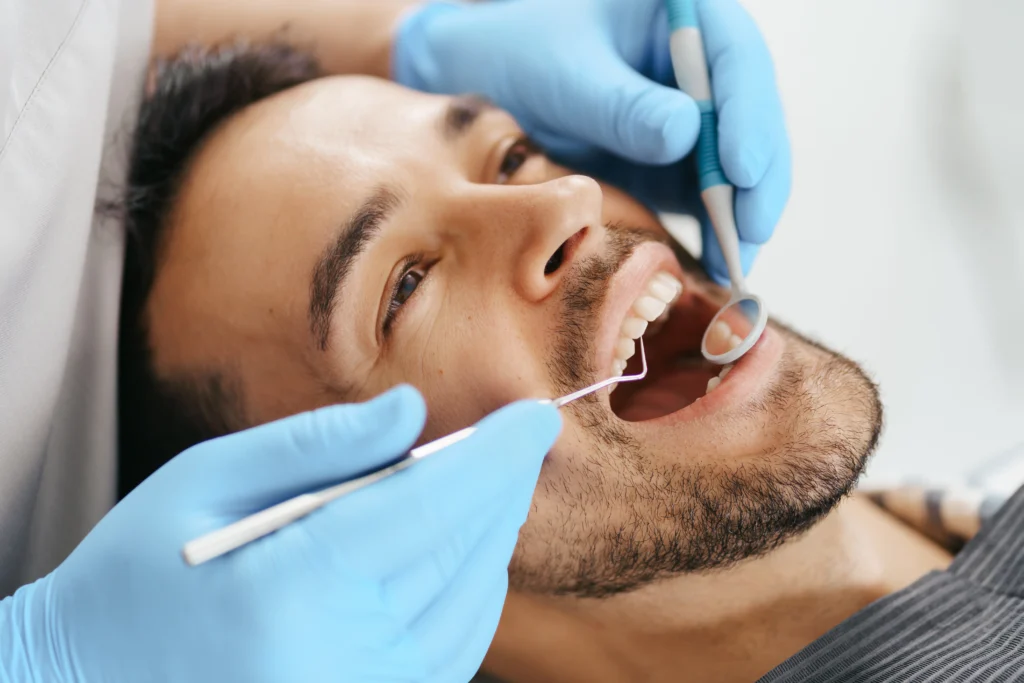
Introduction:
Providing dental services for refugees in Scarborough is a crucial endeavor aimed at addressing the distinct oral health needs of this vulnerable group. Refugees often encounter various obstacles when it comes to accessing dental care, such as financial limitations, language barriers, and limited resources. The availability of affordable dental services for refugees in Scarborough program seeks to bridge these gaps and enhance the oral health outcomes of refugees residing in Scarborough.
Nonetheless, evaluating the efficacy of these services is vital to ensure they meet the intended objectives and have a positive influence on the oral health and well-being of refugees. This evaluation entails assessing factors like access, utilization, quality of care, oral health outcomes, and cost-effectiveness. By conducting comprehensive evaluations, service providers can pinpoint areas for improvement, tailor the services to better suit the unique needs of refugees, and ultimately enhance the effectiveness of the dental services for refugees in Scarborough.
Challenges and Solutions in Providing Dental Services for Refugees in Scarborough
Providing dental services for refugees in Scarborough comes with various challenges, but there are innovative solutions emerging to tackle these issues. One of the main difficulties is the lack of affordable access to dental services. Many refugees face financial constraints that make it hard for them to afford regular dental check-ups and treatments. Language and cultural barriers also pose significant obstacles, as refugees may have limited English proficiency and unfamiliarity with the dental care systems in Canada.
Another challenge is the limited availability of culturally sensitive dental services for refugees in Scarborough. Refugees often have unique oral health needs due to their diverse backgrounds and past traumas. Delivering culturally sensitive care requires dental professionals to have a deep understanding of refugees’ cultural norms, beliefs, and preferences. Additionally, the shortage of dental professionals who can communicate effectively in the languages spoken by refugees hinders proper care provision.
In response to these challenges, innovative solutions are being implemented. Non-profit organizations, community health centers, and volunteer dental services for refugees in Scarborough are stepping up to provide free or low-cost dental services to refugees, bridging the financial gap and ensuring accessibility.
Community engagement and partnerships with local organizations and cultural community centers play a crucial role in reaching out to refugees and spreading awareness about available dental services.
Furthermore, dental clinics which provide dental services for refugees in Scarborough and organizations are actively recruiting and training multilingual staff members to enhance communication with refugee patients. Cultural competency training for dental professionals is also prioritized to ensure respectful and sensitive care delivery. Outreach programs and educational initiatives are being developed to improve oral health literacy among refugees and empower them to take better care of their dental health.
- The Impact of Oral Health on the Well-being of Refugees: A Case Study of Scarborough
The well-being of refugees in Scarborough is greatly influenced by their oral health, as revealed in a case study. Refugees face various challenges that impact their oral well-being, including limited access to dental services for refugees in Scarborough, language barriers, and cultural differences.
The consequences of poor oral health among refugees are both physical and psychological. Oral pain and discomfort can hinder their ability to eat, sleep, and speak, affecting their overall health and nutrition. Neglected oral conditions, such as tooth decay and gum disease, can also worsen chronic diseases and diminish their quality of life.

Moreover, the psychological impact of oral health problems should not be underestimated. Dental issues can lead to embarrassment, low self-esteem, and social isolation, as refugees may feel self-conscious about their appearance or fear judgment due to cultural disparities in oral hygiene practices. This negatively impacts their mental well-being and integration into the community.
Addressing the oral health needs of refugees in Scarborough necessitates a comprehensive approach. It involves providing accessible and culturally sensitive dental services for refugees in Scarborough, promoting oral health education, and fostering collaborations within the community. Non-profit organizations, community health centers, and volunteer dental clinics play a crucial role in delivering dental care to refugees, often at reduced or no cost.
Moreover, overcoming language barriers with language support services and interpreters is essential for effective communication. Providing culturally sensitive care that acknowledges the unique backgrounds and experiences of refugees is vital for building trust and achieving positive oral health outcomes.
- Promoting Oral Health Education and Prevention among Refugee Populations in Scarborough
To enhance the overall well-being of refugee populations in Scarborough, it is crucial to promote oral health education and prevention. Refugees often encounter specific obstacles such as language barriers, cultural differences, and limited access to dental services for refugees in Scarborough, underscoring the importance of education and preventive measures in their oral healthcare.
Educational efforts play a pivotal role in empowering refugees by providing them with knowledge about oral health practices and the significance of preventive care. Tailoring oral health education materials and conducting interactive workshops in languages commonly spoken by refugees can improve their comprehension and engagement. These initiatives typically cover topics such as proper brushing and flossing techniques, regular dental check-ups, dental cleanings, and the impact of diet on oral health.
Collaboration between dental professionals, dental services for refugees in Scarborough, community organizations, and cultural community centers is essential for effective oral health education. By partnering with trusted leaders and organizations within the community, dental professionals can establish trust and design educational programs that address the specific needs and cultural preferences of the refugee population.
In addition to education, preventive strategies like fluoride treatments, sealants, and oral hygiene kits can be implemented to decrease the occurrence of dental issues. Regular dental screenings and preventive interventions enable early identification of oral health problems, preventing further complications and minimizing the need for invasive treatments.
Furthermore, incorporating oral health education into broader health programs aimed at refugees, such as resettlement and integration initiatives, can reinforce the importance of oral health within the context of overall well-being.
- Addressing Dental Health Disparities among Refugee Children in Scarborough
Efforts to tackle dental health disparities among refugee children in Scarborough must be targeted and comprehensive, aiming to improve their oral well-being and reduce inequities in accessing dental services for refugees in Scarborough. These children often encounter various obstacles, such as financial limitations, language difficulties, and cultural disparities, which impede their ability to receive essential dental services.
One key approach to addressing these disparities involves enhancing access to dental services for refugees in Scarborough and for refugee children. Collaborative initiatives among dental clinics, community organizations, and government agencies can be established to provide cost-effective or affordable dental services specifically tailored to meet the needs of refugee children.
Outreach programs and mobile dental clinics can be utilized to reach those with limited mobility or transportation options.

To ensure effective communication and culturally sensitive care, it is important to overcome language and cultural barriers. This can be achieved by hiring multilingual dental professionals or offering interpreter services, enabling improved communication with refugee children and their families.
Additionally, providing cultural competency training to dental providers equips them with an understanding of the cultural norms, beliefs, and preferences of refugee populations, enabling them to deliver care that respects and accommodates their unique requirements.
Implementing preventive measures, including oral health education programs and school-based dental screenings, plays a critical role in addressing dental health disparities. Integrating oral health education into school curricula and community centers empowers refugee children with knowledge about proper oral hygiene practices and the significance of regular dental check-ups. Conducting dental screenings in schools helps identify dental issues at an early stage, allowing for timely intervention and treatment.
- Innovative Approaches to dental services for refugees in Scarborough
To provide dental services for refugees in Scarborough effectively, innovative approaches are necessary to address their unique challenges. Refugees often face obstacles such as limited resources, language barriers, cultural differences, and restricted healthcare access. In response, various innovative strategies have emerged to ensure fair and accessible dental care delivery.
One promising approach is tele-dentistry, which enables remote consultations and advice for refugees with limited access to dental services for refugees in Scarborough. Virtual consultations allow dental professionals to assess oral health concerns and provide timely guidance, bridging the gap in access to dental care.
Mobile clinics which provide dental services for refugees in Scarborough have also proven effective in reaching refugees in underserved areas. These portable clinics can be deployed to refugee camps, community centers, or schools, offering on-site preventive and basic dental treatments. By bringing dental services directly to the communities, mobile clinics enhance accessibility and reduce barriers for refugees.
Collaborations between dental professionals and community organizations have played a crucial role in improving dental services for refugees in Scarborough. dental services for refugees in Scarborough and various outreach programs, conducted in partnership with local organizations, provide education, screenings, and preventive treatments. These initiatives promote oral health awareness, deliver culturally sensitive care, and foster community engagement.
Furthermore, training and capacity building programs empower refugees to become dental care providers within their communities. By equipping refugees with training and resources, they can actively participate in delivering dental care, addressing the shortage of dental professionals while promoting cultural competence and self-sustainability.
- Evaluating the Effectiveness of Dental Services for Refugees in Scarborough
To gauge the effectiveness of providing dental services for refugees in Scarborough, it is crucial to evaluate the impact of these initiatives and identify areas for improvement. Evaluations play a vital role in ensuring that the dental services offered are suitable for the specific needs of refugees and contribute positively to their oral health and well-being.
An important aspect of evaluating the effectiveness of these services involves assessing access and utilization. This entails examining the awareness and utilization rates among refugees, as well as identifying any barriers that hinder access. Understanding these factors helps identify gaps in service delivery and develop strategies to improve utilization.
Assessing the quality of care provided is another critical aspect of evaluation. This can be done by gathering patient satisfaction feedback, evaluating the technical proficiency of dental professionals, and assessing the availability and effectiveness of follow-up care. Such evaluations ensure that refugees receive high-quality dental treatment that meets their needs and expectations.
Monitoring the impact of the free dental services on oral health outcomes is also necessary. This includes tracking changes in oral health status, such as improvements in dental hygiene, reduction in dental diseases, and the need for emergency treatments. Tracking these outcomes provides valuable insights into the effectiveness of the services in enhancing oral health among refugee populations.
Additionally, evaluating the cost-effectiveness of the free dental services helps determine their sustainability and efficiency. This involves comparing the costs of providing the services with the benefits gained in terms of improved oral health and reduced long-term dental care needs. This evaluation aids in making informed decisions about resource allocation and ensures optimal utilization of available resources.
Conclusion:
In conclusion, evaluating the dental services offered to refugees in Scarborough holds significant importance in guaranteeing their effectiveness and impact on oral health outcomes. By examining aspects like access, utilization, quality of care, oral health outcomes, and cost-effectiveness, service providers can identify areas for enhancement and make necessary adjustments to better cater to the specific needs of refugees. Through these evaluations, barriers to accessing dental care can be identified and addressed, while strategies can be developed to boost utilization rates.
Moreover, monitoring the influence of these services on oral health outcomes assists in determining their effectiveness in improving the oral health status of refugees in Scarborough. By continuously evaluating and enhancing the provision of dental services with various program such as Interim Federal Health Program, we can work towards reducing oral health disparities, promoting overall well-being, and restoring smiles among refugee populations in Scarborough.

